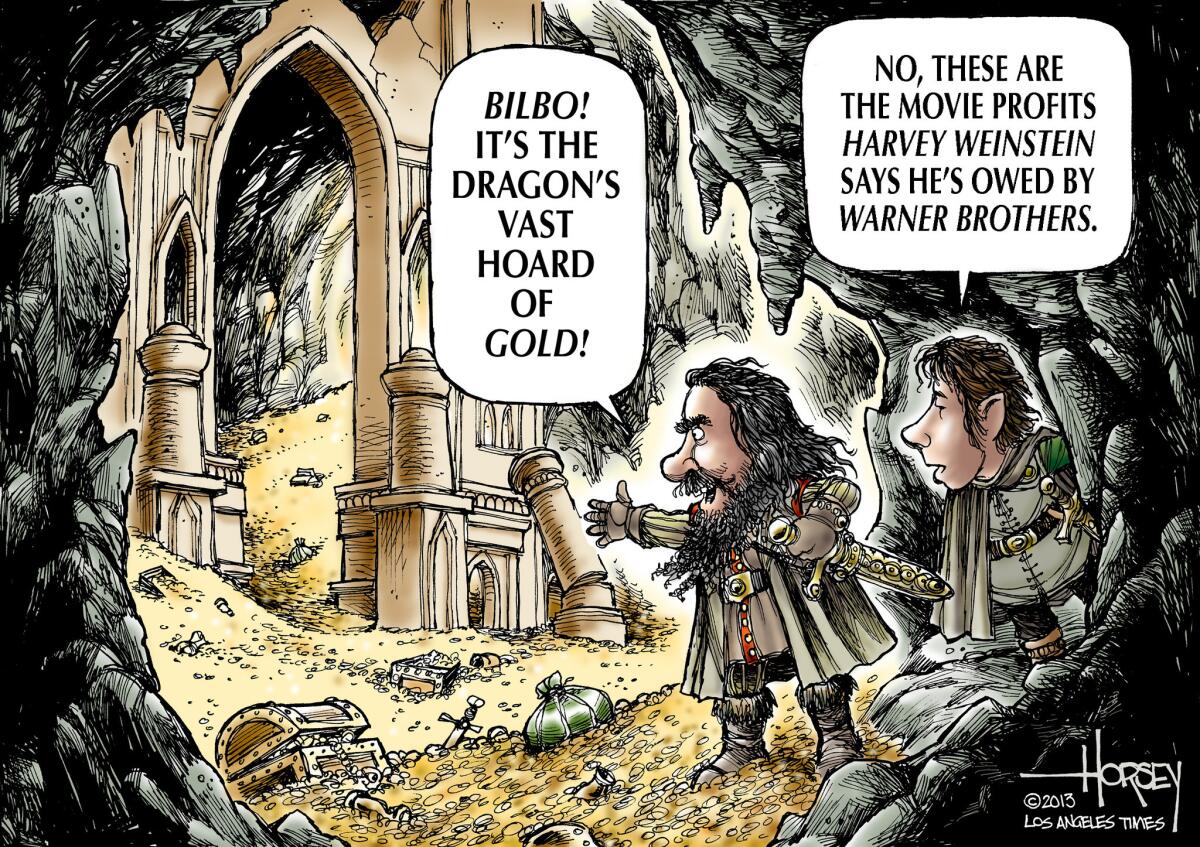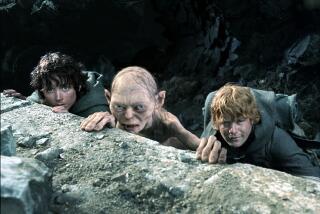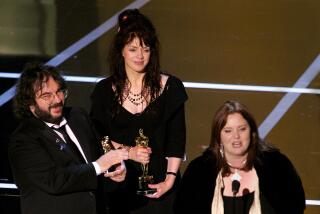Movie moguls do battle over ‘The Hobbit’s’ golden hoard

- Share via
“The Hobbit: The Desolation of Smaug” opens Friday with little doubt it will bring Warner Bros. a hoard of gold, just as the first movie in the series did and as the final installment of the trilogy is bound to do when it is released a year from now. And, as was the case with the three “Lord of the Rings” films that preceded it, some of the biggest battle scenes may be between lawyers for the parties with a financial claim on the film.
Producer Harvey Weinstein is demanding a share of profits from all three movies because he and his brother, Bob Weinstein, owned Miramax when that studio held screen rights to “The Hobbit.” Warner Bros. counters that the Weinsteins are only owed a share of the take from the first Hobbit film, not parts two and three. The dispute is heading to arbitration.
Eight decades ago, when Oxford don J.R.R. Tolkien wrote a short book with a big, mythic back story for his children, it is certain he never imagined his tale would be super-sized into a trio of blockbuster films with a global audience that paid out more than $1 billion to see the series’ first installment. The second and third movies are expected to earn just as much – a huge amount of money for the movie moguls to fight over.
PHOTOS: 60 images from ‘The Hobbit: Desolation Smaug’
With “The Hobbit” and that book’s much grander, three-volume sequel, “The Lord of the Rings,” Tolkien spun a literary magic that enchanted generations of readers. Anyone who could capture that magic with a movie camera was bound to make some big bucks. Director Peter Jackson has achieved that task and has reaped the rewards. His three “Lord of the Rings” films grossed close to $3 billion. “Return of the King,” the third movie in the series, won the Best Picture Oscar and 11 other Academy Awards.
One would think that, were he alive, Tolkien would be pleased by the way Jackson has carefully and lavishly visualized Middle-earth. Whether he would be pleased with the way the director and his co-screenwriters have adapted the storyline is harder to say. If the reaction of Tolkien’s son to the first three movies is any indication, the elder Tolkien might well have found a pretext to call in his own attorneys.
“They eviscerated the book by making it an action movie for young people aged 15 to 25, and it seems that ‘The Hobbit’ will be the same kind of film,” Christopher Tolkien said in an interview in 2012 before the release of “The Hobbit: An Unexpected Journey.” If he thought Jackson’s “Lord of the Rings” movies, which were largely true to the books, was an evisceration, how would he characterize what Jackson has done with “The Hobbit?”
In this second trio of Middle-earth movies, Jackson has taken greater liberties, expanding and darkening Tolkien’s children’s story to match the epic heft of “The Lord of the Rings.” He has added new material from Tolkien’s other works and concocted an arrow-shooting elf named Tauriel to add a feminine presence to the male-dominated story.
Christopher Tolkien groused that, in the screen adaptations, his father’s work had been stripped of “beauty and seriousness.” He said, “Such commercialization has reduced the aesthetic and philosophical impact of this creation to nothing.”
Well, not really. Yes, the studios have made a mountain of money and, yes, a few battle scenes are too resonant of a video game, but, despite what Tolkien’s son may think, the films are not mere commercial vehicles that reduce his father’s works to “nothing.” On the contrary, Jackson has paid great tribute to Tolkien by reimagining the great fantasist’s tales on film so successfully and, in many important ways, so faithfully.
ALSO:
Horsey on Hollywood: Gunplay in PG-13 movies
Horsey on Hollywood: CNN in Pickle
Horsey on Hollywood: Netflix nettles competitors
More to Read
From the Oscars to the Emmys.
Get the Envelope newsletter for exclusive awards season coverage, behind-the-scenes stories from the Envelope podcast and columnist Glenn Whipp’s must-read analysis.
You may occasionally receive promotional content from the Los Angeles Times.











